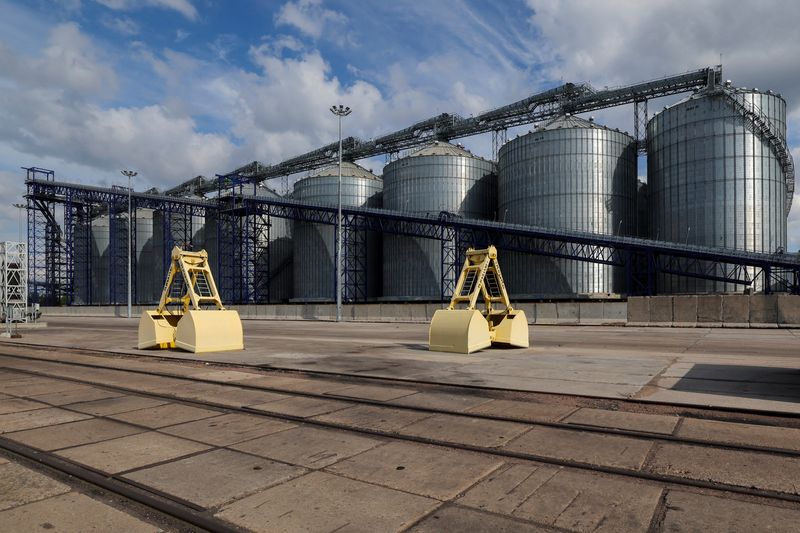By Olga Popova and Gleb Stolyarov
MOSCOW (Reuters) – Russia, the world’s top wheat exporter, is expanding its Baltic Sea ports as it aims to increase agricultural exports by 50% by 2030 while reducing dependence on traditional Black Sea routes, officials and executives said .
The country, which exported at least 72 million tonnes of grain in the 2023/2024 season, is looking at new markets in Latin America and Africa to diversify from traditional grain markets in North Africa and the Middle East.
The country has relied on its Black Sea ports to handle booming agricultural exports in recent decades, but the conflict with Ukraine has made the area risky for shipping, with both sides regularly attacking each other.
“Last year’s record harvest showed that at the pace of supply we do not have enough capacity for exports,” Ksenia Bolomatova, deputy head of state-controlled agricultural conglomerate OZK, which owns several terminals on the Black Sea, told a industry meeting in Sochi in southern Russia.
Over the past 18 months, Russia has launched two major ports, Vysotsky and Lugaport, in the Gulf of Finland, not far from St. Petersburg, the birthplace of President Vladimir Putin.
Vysotsky shipped its first grain in April 2023, while Lugaport started operations in June this year and capacity is expected to reach 7 million tonnes by early 2025, owner Novaport said.
Dmitry Rylko of the agricultural consultancy IKAR said the two ports will be able to handle up to 15 million tons of agricultural exports, including grain, per year.
That would account for a quarter of Russia’s grain exports of 60 million tons forecast for the 2024/2025 season.
The private company Primorsky UPK is also planning a grain terminal at the Primorsky port with a capacity of up to 5 million tons.
EXPORT RESTRICTIONS
Putin has set a target of increasing agricultural exports by 50% by 2030 as part of a strategy to strengthen the country’s position as an agricultural superpower along with Brazil, the United States and China.
Russia has become the world’s largest exporter of wheat, corn, barley and peas in the past decade, but further growth could be limited by bottlenecks in shipping capacity.
Many Russian ports have announced plans to increase capacity following record harvests in the past two years. Terminals in the Baltic Sea are expected to grow faster.
“The expansion of terminal capacity in the Baltic Sea is a matter of economic and transport security and sovereignty,” Novotrans said in an emailed comment.
Russian trade flows and transports have so far seen no major disruptions in the Baltic Sea, where 96% of the coastline is owned by NATO members, including Finland and Sweden.
In contrast, disruptions in the Black Sea are increasing and global grain supplies could decline, according to a World Bank report. Two weeks ago, a Ukrainian ship carrying grain to Egypt was hit by a missile.
In August, Russian local authorities said Ukraine sank a ferry carrying fuel tanks in Port Kavkaz, which is also used for grain transhipment.
ECONOMIC PROFESSION
Russia exported 62 million tonnes of grain by sea in the 2023/24 season, with 90% of supplies passing through the Black Sea, mainly to markets in the Middle East and North Africa. This share is expected to decrease as the infrastructure in the Baltic Sea grows.
Baltic seaports loaded 1.5 million tons of grain last season, a threefold increase from the previous season, but still only 2.4% of total Russian exports, according to Reuters calculations based on publicly available data.
“Logistically, the Baltic Sea has many advantages for grain exports,” said Darya Snitko, vice president of Gazprombank, one of Russia’s largest banks and one of the largest lenders to farmers.
She said the ability of Baltic terminals to handle larger ships should help reduce overall costs.

“Supplies from the Baltic Sea exceed (the economy of) shipments from the Azov-Black Sea region when trading with countries in Africa beyond the Mediterranean and with Asia,” she added.
Vysotsky has shipped grain to Algeria, Brazil, Cuba, Mali, Mexico, Morocco, Nigeria and Tunisia, data from logistics company Rusagrotrans shows.


